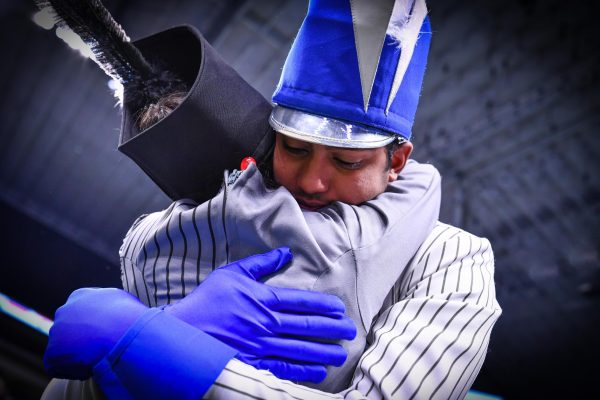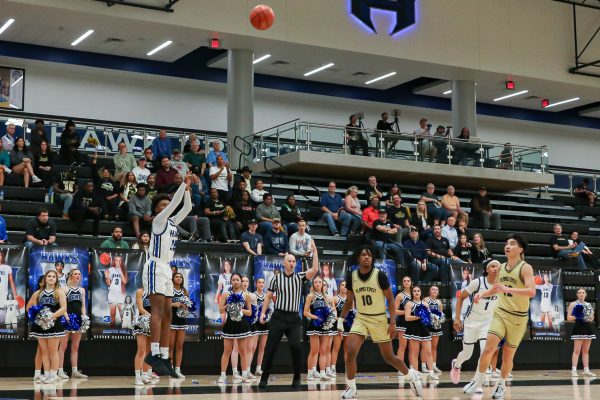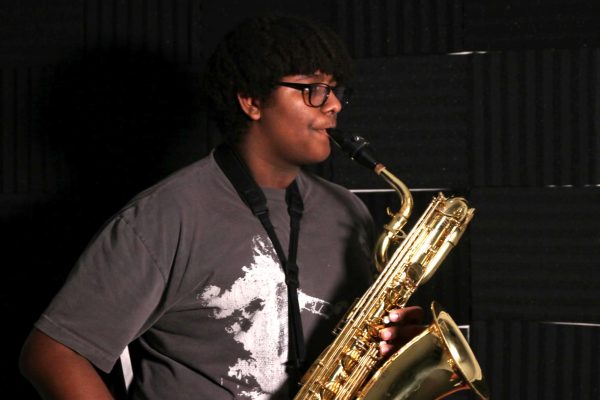Heart-to-Heart: Senior suffers against abnormal cardiac condition
Outside it was dark, dark enough to watch your reflection in the car window. The air was still and cool, March air, and Senior Austin Hall and his girlfriend, Taylor Williams, were on their way home. The wheels of Taylor’s Ford Fusion, rolled heavily against the black top, away from a movie date. It was a quiet moment in contrast to the glitter of the cinema. A moment when nothing could go wrong. Until it does.
Austin suddenly experienced what most anyone would identify as a heart attack. The right side of his body went numb. The side of his face fell slack.
“OK,” Austin said, coming to a stop in the center of the road. “You have to drive.”
The two made their way toward the emergency room. Austin doesn’t seem to hold the aspects that one would typically associate with heart conditions. He’s strong and bright, with sandy hair and a gaggle of experiences ahead of him.
His heart isn’t like most, though. It has incidents, and after the condition presented itself for the first time late last year, he and his family decided it would be for the best to find out what was going on. So he went in for a day surgery.
Waking up, he had one thought: “Did they fix anything?”
The answer: “No.”
In short.
Austin was admitted into Plano Presbyterian at 6:30 a.m. a few days after his 18th birthday for an Electric Pulse (EP) procedure with the hope that doctors would be able to find a diagnoses.
“I would just be sitting on the couch and [my heart] would just accelerate out of nowhere,” Austin said. “So I saw like six different doctors and nobody knew what was going on.”
In an age where we’ve come to expect an answer from physicians for any problem, it can be troubling to find out there are cases when the doctors aren’t quite sure what is going on. Cases like Austin’s.
Supervantricular tachycardia (SVT) is a condition in which the heart will accelerate for reasons unrelated to physical exertion, stress or fever.
“They went in for about an hour and messed with his heart,” said Kim Hall, Austin’s mother. “Sped it up and slowed it down. Did everything they could to make it go into SVT. The doctor said they couldn’t get his heart to simulate what they were looking for.”
Doctors were confident that Austin’s heart would indicate SVT after running tests, but they failed to find that correlation.
“I was actually just pretty angry,” Austin said. “I remember just sitting there wondering what the heck was wrong.”
And though the procedure didn’t provide all the answers he was looking for, Austin agrees that it was not in vain.
“[The doctor] said he was able to rule a whole bunch, I guess things you would consider life-threatening, out,” Austin said. “So it wasn’t that bad.”
For lack of a more defined diagnosis, doctors have referred to Austin’s condition as what it might be, what they were looking for it to be: SVT.
“For a while my heart was just beating weird,” Austin said. “It would just skip beats and then it would go from a resting heart rate to an athletic heart rate.”
After the EP, Austin had a small weight off his shoulders. The doctors still didn’t know what he had, but they knew what he didn’t. Still, since the EP, Austin has had serious incidents involving his heart. On the way to the hospital, Austin continued to experience all the clear indications of a heart attack. Light headedness and wooziness led Austin to ask his girlfriend to speed up, hoping to reach the hospital before he passed out.
“Of course, as soon as she sped up we got pulled over by a cop,” Austin said. “And so the cop comes over, he asks if there’s an emergency. We tell him we’re on the way to the emergency room.”
Following protocol, the officer called an ambulance. It arrived with a fire truck, and after Austin was adjusted inside, everything continued as planned. Heart rate was normal, blood pressure was fine, until the halfway point to the hospital. Austin’s heart rate swelled to around 189 beats per minute.
An average adult resting heart rate falls some where between 60-100 beats per minute.
“My blood pressure skyrocketed,” Austin said. “I went super lightheaded. I thought I was gonna pass out but I didn’t, and the EMT was kind of freaked out a little bit, then the ambulance started going like 90, and we got to the hospital really fast.”
Austin was admitted into the hospital at around 10 p.m. Doctors took blood and analyzed it, while Austin waited into the early morning for a verdict. At around 2 a.m., Austin was free to go home. Free to go to home and deal with what just happened.
“That was fun,” Austin said.
Except it wasn’t fun at all. SVT has similarities to panic attacks.
“It is very serious,” Kim said. “To the patient, they feel like they’re having a heart attack. It’s not life-threatening at that moment, but it kind of feels like that, and trying to get them under control, cause if your heart rate gets up there too high it could lead to some issues.”
Even though SVT is a manageable condition, patients have to remain watchful and take certain precautions.
“The episodes like that, I mean, you can’t die they’re just real freaky,” Austin said. “Sometimes you have to go and get medicine to slow your heart rate, which is what I’m on now, you have to take pills every morning… and actually make it slower than most normal heart rates. Hopefully that will continue to work.”













